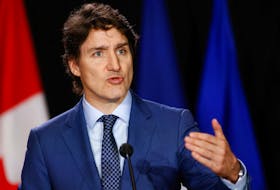Can the federal Conservative party win majority government in 2019?
According to an Angus Reid poll, 40 per cent of Canadians would vote for a Conservative candidate in their riding — a 10-point advantage over the Liberals. An Ipsos poll gave the conservatives a five-point lead.
For Andrew Scheer to increase the margin of his lead, he must obtain additional support in Quebec. After all, that was, in 2015, the only province in which the Conservatives made gains; their seat count rose from seven to 12.
The Bloc Quebecois is in disarray. On Feb. 28, seven out of 10 members quit the party, accusing leader Martine Ouellet of being too much of a separatist. Those that quit, and their constituents, may recall that during the 1995 Quebec referendum and also in the Quebec election some four years ago, one issue that may have contributed to the defeat of the separatists was that in the event of independence, Quebecers would become “Non-residents of Canada.” They would then face unaffordable hospital charges in the rest of Canada. For example, at present, the charge for one day in the Intensive Care Unit is $18,540 at Victoria General Hospital, Halifax. Foothills Medical Centre in Calgary charges $16,868. The daily rate for just a bed at the Vancouver General Hospital is $13,940 — not including medications, CT, MRI scans, blood work, and other diagnostic tests.
This argument can never be refuted by separatists.
If the BQ implodes, voters in those ridings were initially thought to favour the Liberals. This could change if Andrew Scheer finally introduced legislation that would give them fully portable health care in the rest of Canada.
Despite the Canada Health Act, Quebec has always refused to sign a reciprocal billing agreement providing doctors payment at host-province rates. Also, its rates until recently were the lowest in Canada. Few MDs outside of that province will accept a Quebec health card. On its official website, the Quebec government suggests for persons going outside the province that, “It’s a good idea to take out private insurance.”
This fails to solve the problem for many.
Those with pre-existing conditions such as diabetes mellitus, cardiac disease, malignancies, etc. may find their claims disallowed because they are deemed to be “unstable” by having changed the dose of medications within 3 to 6 months of travelling.
From 2011 to 2016, some 92,320 persons left Quebec permanently for another province. For the first three months, they were supposedly “covered” by Quebec. Yet few MDs would accept their health card, and they could not purchase private insurance that would cover elective visits. What would be the impact if they required prescription renewals, routine blood work, etc. until they were fully covered by their new province?
Due to a shortage of family physicians and specialists, West Quebec patients often seek care in Ottawa. Most pay out-of-pocket, are only partially reimbursed much later and hence become “second-class” citizens in their own country. Some as a result wait many months to have cancer and other surgery done in Montreal.
Although health-care delivery is largely a provincial matter, it is uncertain which province has jurisdiction in these instances; there is a role for the federal government, but clearly it will never force Quebec to comply with the Canada Health Act. Hence, Andrew Scheer should introduce legislation setting up a mechanism for direct payment of physicians that treat patients outside their home province. Ottawa already pays MDs directly for the care of federal prisoners, for refugees (through the IFHP) and until a few years ago, for members of the RCMP.
Newfoundland and Labrador would save nearly $5 million per year and all provinces — not just Quebec — would benefit financially. Despite an $18.1 billion federal deficit, this is justifiable; I estimate that the annual cost for just Quebec residents would be only $175 million.
The Liberal party and the NDP should not oppose this proposal. It is affordable, fair to patients and physicians, and would promote national unity.
The population is aging; some have diabetes mellitus, cardiac disease etc. and are therefore at risk of suffering an unexpected heart attack, stroke, or other serious illness when away from home.
Sadly, nothing has changed since my letter in The Telegram nearly a year ago. After over three decades of political indecision, is it not finally time to resolve this problem? It has caused not only financial inconvenience, but likely in many cases, adverse health outcomes. Andrew Scheer can lead the initiative.
In the words of Margaret Mead, “Never doubt that a small group of committed citizens can change the world; it’s the only thing that has.”
Dr. Charles Shaver
Ottawa









